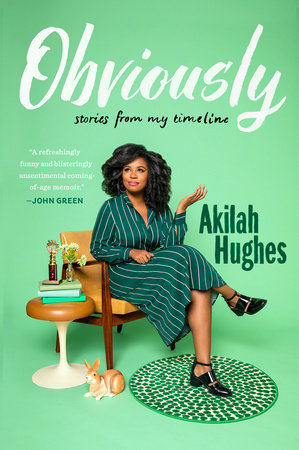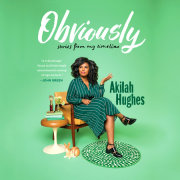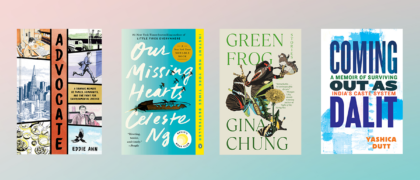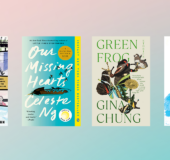A Note
Hello, Dearest Reader.
I’m a big fan. You have no idea how long I’ve wanted to meet someone who thinks I’m interesting enough to spend hours, days, weeks (!!!) with, hearing exclusively about my life and choices, good and bad, and then either lending this book to a friend, buying a copy for everyone you know, or letting it sit on your shelf until one day you leave it on a stoop, opting to declutter your home by listening exclusively to audiobooks or getting a Kindle or something. I’ll admit it’s scary telling you everything about me and not knowing anything about you at all. If you’re my fifth-grade teacher, Ms. Murphy, put this book down. Or, you know what, don’t. I hate you and you need to read what I have to say about you and feel shitty about it. You’re shitty.
If you’re not my fifth-grade teacher, hi! I’m Akilah, obviously. (Or not so obviously, if you’ve never heard of me.) You may recognize me from HBO’s Pod Save America series, from one of the hundreds of videos I’ve made on YouTube, or as the curmudgeonly lady on the G train contorting her body to fit into a middle seat. I’m old enough to remember when the internet got good and young enough to still think I know everything.
Even if you have seen me on TV or the internet, you probably don’t know that I am a former spelling-bee champion, Southerner, Sundance Labs alum, and Disney cast member. I’ve lived a lot of lives so far (all of them black, all of them matter), and it was never really all that obvious how things would turn out. Hell, it still isn’t very obvious how things will turn out. The world is nuts, and I hope by the time you read this book it’s chilled out a little.
In the event that it hasn’t, I’ll be helping you find joy in therapeutic karaoke, solace in falling suddenly ill, and justice in what your acne has done to you. I wouldn’t call this a self-help book, but you will feel better about your own life after reading a number of these essays. That’s help, right?
My editor spent a lot of time telling me how important it is for a book to have a thread. I’m not sure if I ever found the single thread holding my whole life together, but if there is one it must be something about how I’ve managed to do mostly whatever I want while somehow never fitting in in any meaningful way. I saw Cher perform in Vegas by myself (fifty dollars for a ticket to see someone with such a legacy is actually appallingly low), and she did a number of captivating monologues in between songs. In one she talked about her best friend, Pauli, blowing her cover when she saw a cute guy walk into a bar. In another she said, “I never really fit in. Singers didn’t think I was singer. Actors never thought I was an actor, they thought I was a singer. When I did the variety show it really fucked with everyone.” And that’s kind of how I feel about this book.
YouTubers never really thought of me as a YouTuber; they thought I was a comedian. Comedians and actors always think of me as a YouTuber. And my book is my variety show. You’ve got to stay to the end to know if it is good or not, but it will almost certainly be entertaining.
Racism to a Fifteen-Year-Old Girl
I’ve had a recurring dream my whole life about being shot in the back.
The news media talks about race like it’s the annual flu vaccine or poll results after an election. They talk about figureheads who are long dead or long gray, speaking about “progress” and “the mountaintop” and “the dream.” They add numerical statistics like “Black people are thirty-one times as likely to be gunned down by police as white people” or “Black people are seven times less likely to be armed when shot by police than white people.” They speak in numbers instead of families, friends—people. They talk about race like it is an abstract occurrence that might happen to other people, but certainly isn’t happening to them. How can we solve the race problem? Is there a race problem? What race problem?
Racism is different to a fifteen-year-old girl.
Racism to a fifteen-year-old-girl is being told she’s pretty for a black girl, as if she is pretty in spite of her beautiful grandmother, aunts, and mother.
Racism to a fifteen-year-old girl is reading “classic” literature that’s classically racist with more than thirty incidents of the word “nigger” on a page, and being asked by her teacher why she’s uncomfortable—effectively making the other twenty-four white students in class uncomfortable.
Racism to a fifteen-year-old girl is being told by her white classmate that she is whiter than him because of her less-stereotypical interests, regardless of the fact that she is the only black person he has ever met and had the nerve to speak to.
Racism to a fifteen-year-old girl is a river of white tears about Anne Frank’s diary and the horrors of the Holocaust juxtaposed with rolling eyes, disdain, and exasperation at the mention of American slavery.
Racism to a fifteen-year-old-girl is being mocked for having short relaxed hair when her naturally long curly hair was too “kinky” and “coarse” to be lovable, either.
Racism to a fifteen-year-old girl is sitting on a bus while the boys list all the most beautiful women in the world and realizing they are all white women.
Racism to a fifteen-year-old girl is the pin-dropping silence from her classmates turned strangers at the mention of Black History Month.
Racism to a fifteen-year-old girl is being shamed out of wearing her hair in braids by kids who call her “Kris Kross” while they simultaneously “ooh!” and “ahh!” over her white classmate’s cornrow souvenir from her spring break trip to Jamaica.
Racism to a fifteen-year-old girl is a friend proclaiming that she can go to the “hood,” but only if she’ll accompany her because she’s “scary enough to protect her.”
Racism to a fifteen-year-old girl is crying at night because her crush thinks her nose and lips are too big—and he doesn’t know why he thinks that, so he assumes it’s not a societally influenced impulse, but rather an objective predilection.
Racism to a fifteen-year-old girl is being called scary because her skin doesn’t burn in the sun.
Racism to a fifteen-year-old girl is a football player proclaiming proudly in a social studies class debate that he doesn’t see race—something she literally has to live and breathe every single moment of her life.
Racism to a fifteen-year-old girl is worrying about the rise of gun violence in America, and fearing that if it ever happens at her school, she’d definitely be on the hit list—not because she’s a bully, but because unwarranted hate toward her appearance goes unchecked.
Racism to a fifteen-year-old girl is hearing “I’m tired of talking about race” when it is twice as exhausting living it, as if she derives some secret pleasure in talking about the devastating effects of diaspora.
Racism to a fifteen-year-old girl is going to every dance alone, because none of her friends’ white parents will consent to their children formally attending anything with a black girl and there aren’t any other black kids at her school.
Racism to a fifteen-year-old girl is real. It is pervasive and ugly. It is the constant threat of depression, anxiety, and self-loathing.
And racism to a fifteen-year-old girl is wishing everyone you knew would understand that. It’s wishing that you could survive the pimples and the braces and the crushes and the social hierarchy without the added burden of having to be aware of your skin color and how it makes other people feel all the time.
Copyright © 2019 by Akilah Hughes. All rights reserved. No part of this excerpt may be reproduced or reprinted without permission in writing from the publisher.









